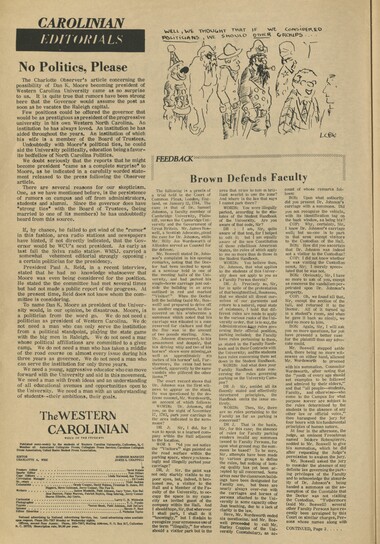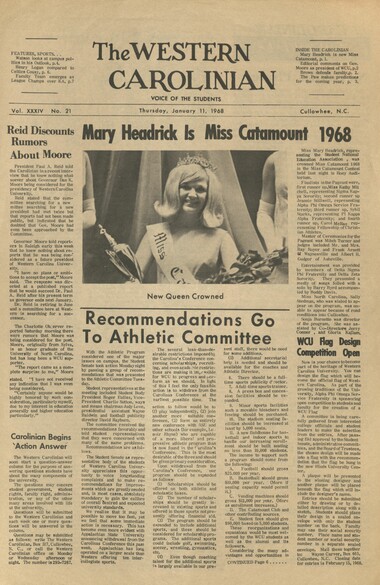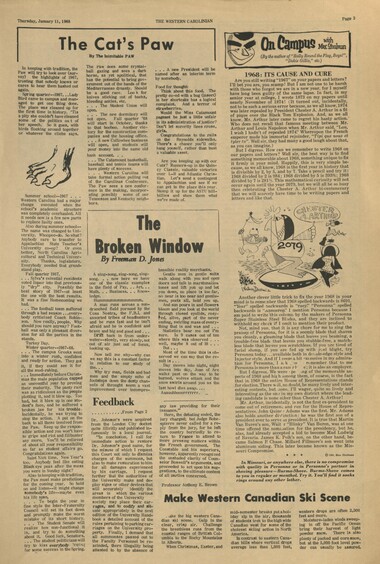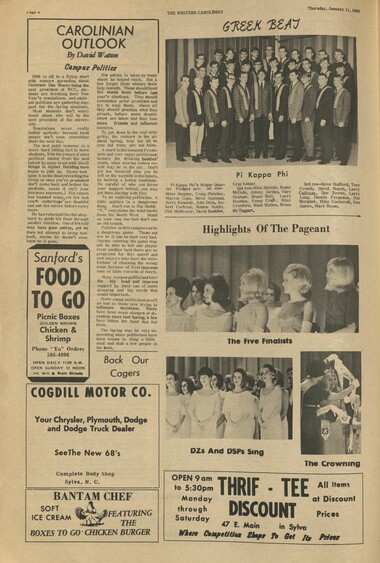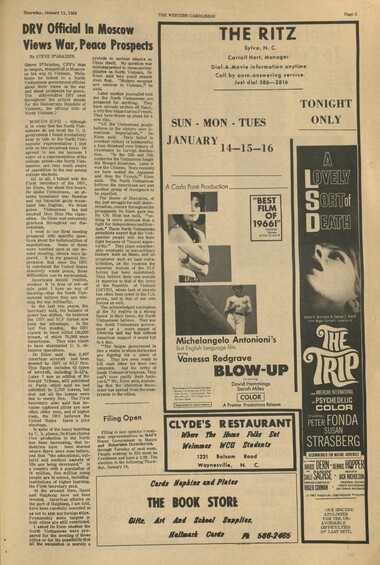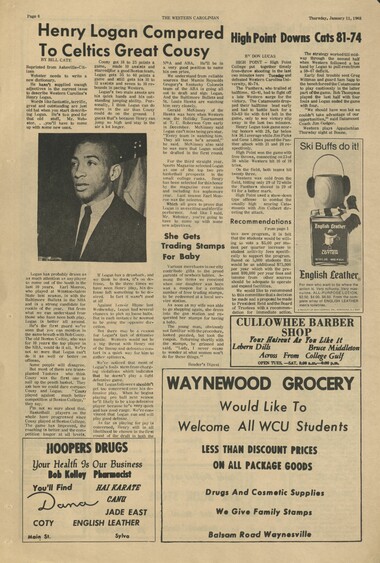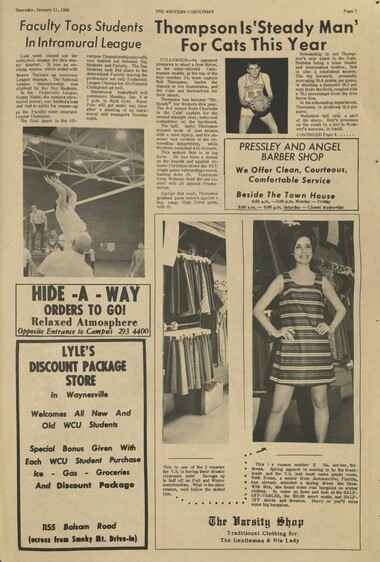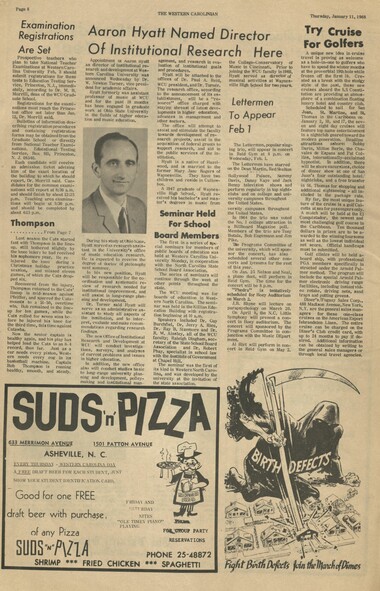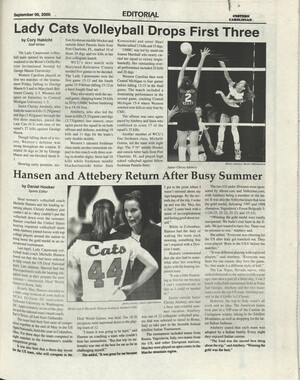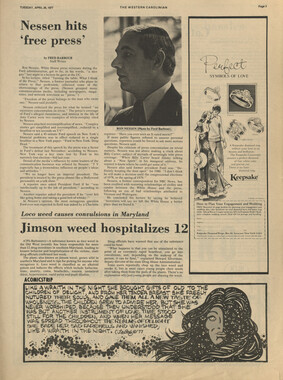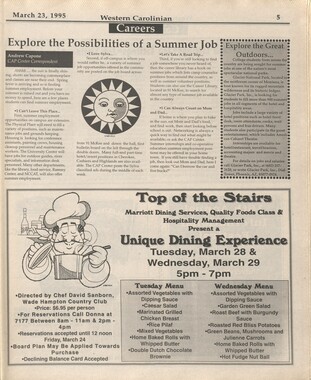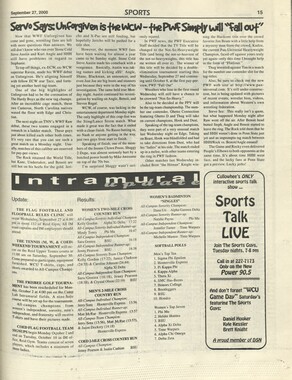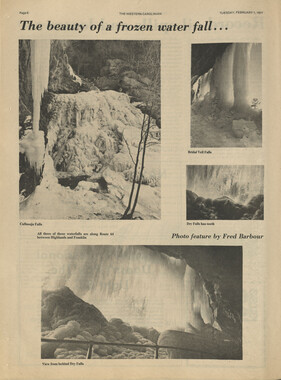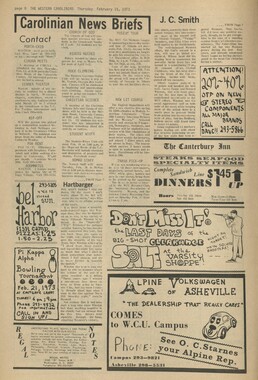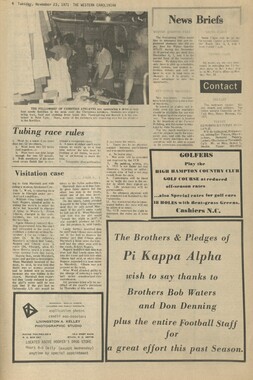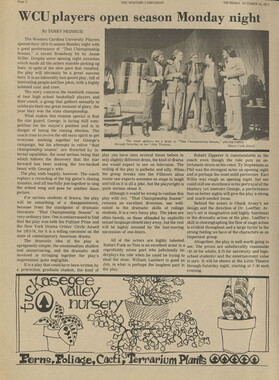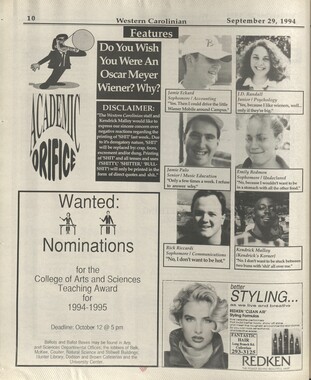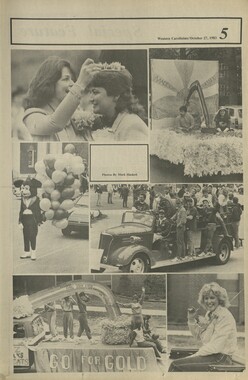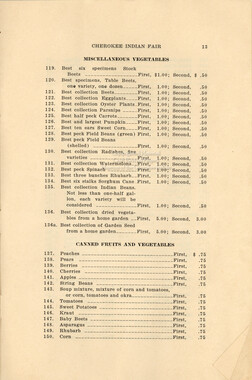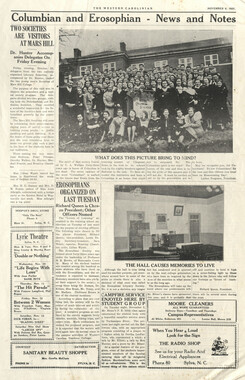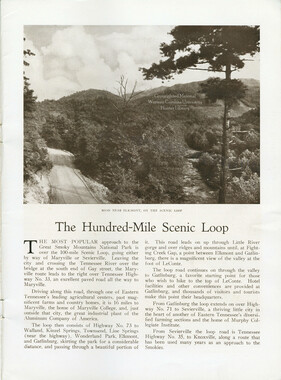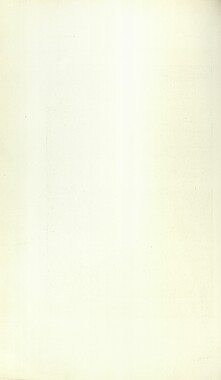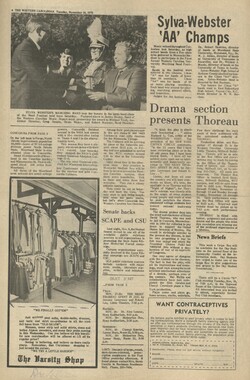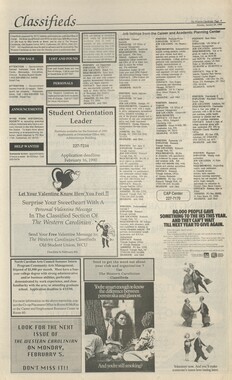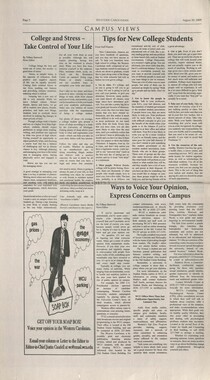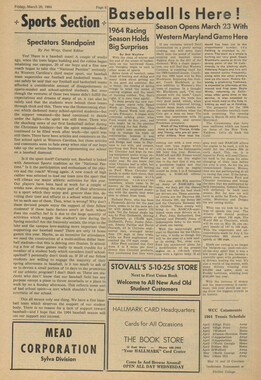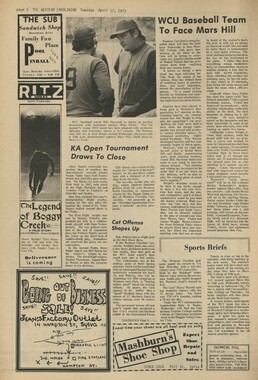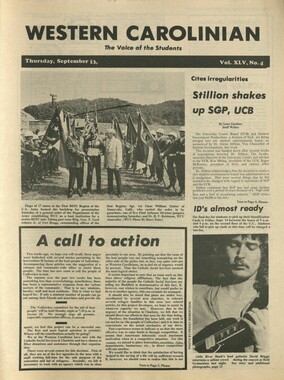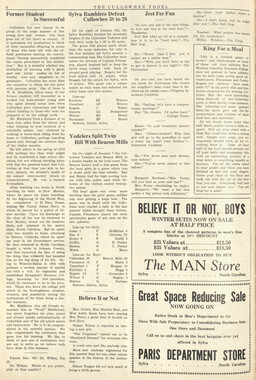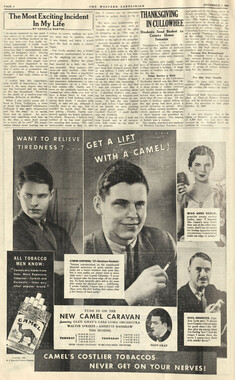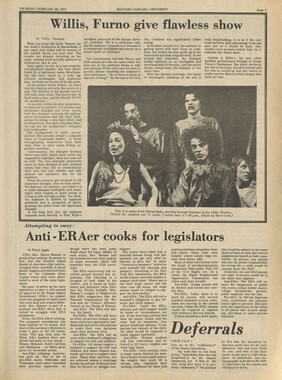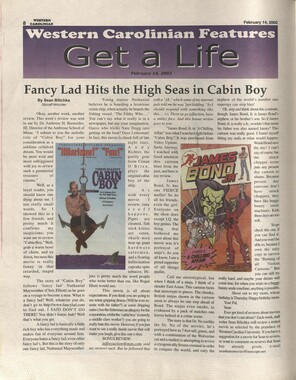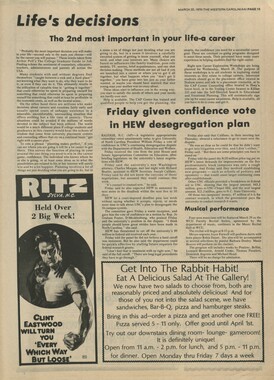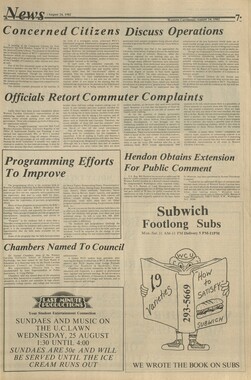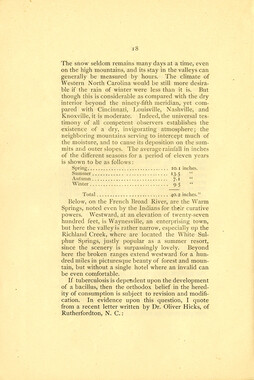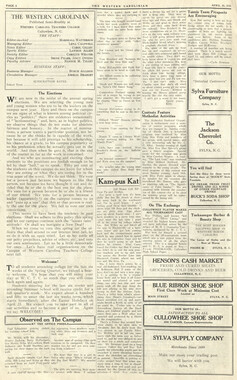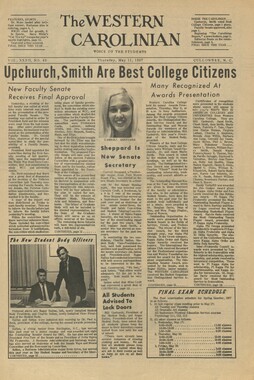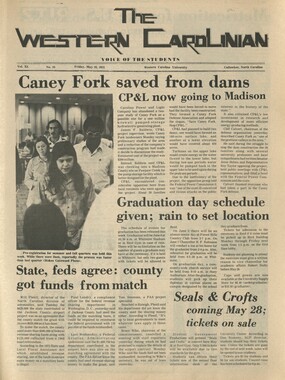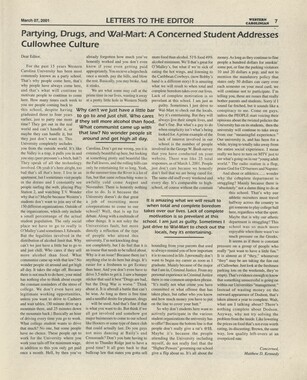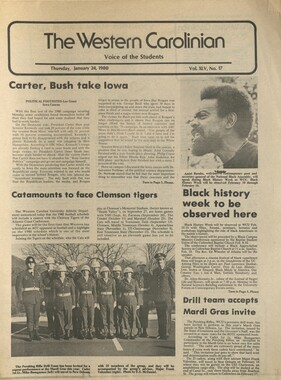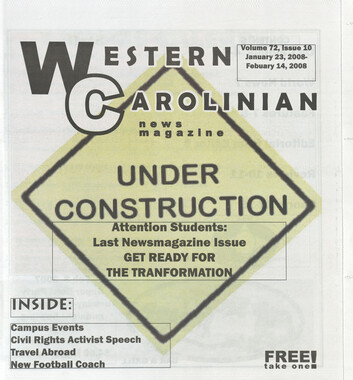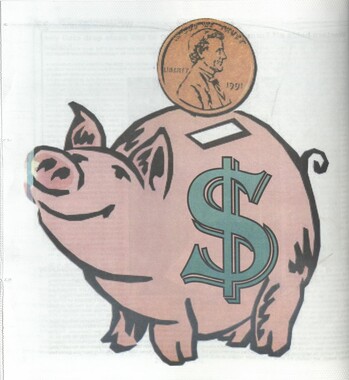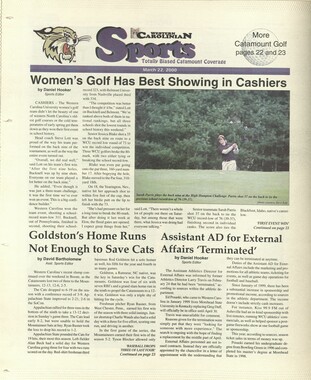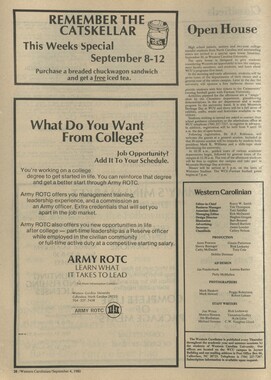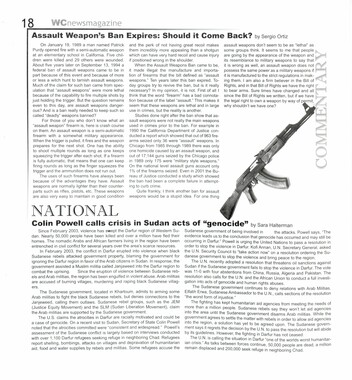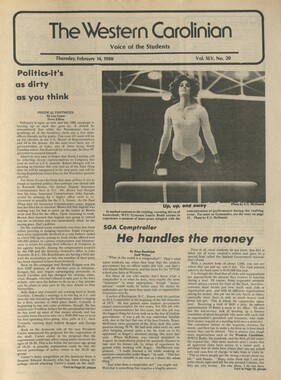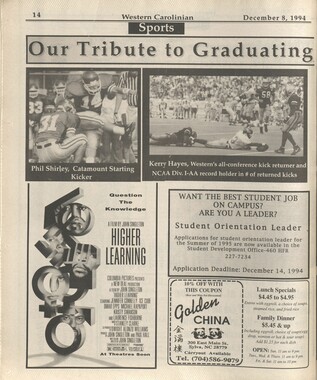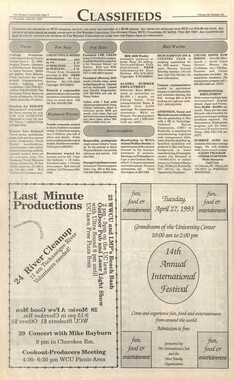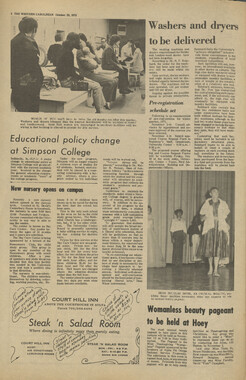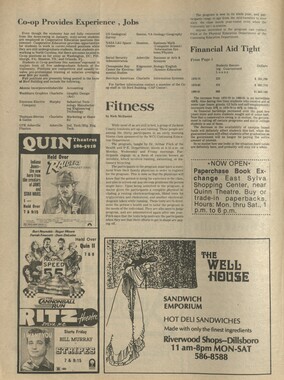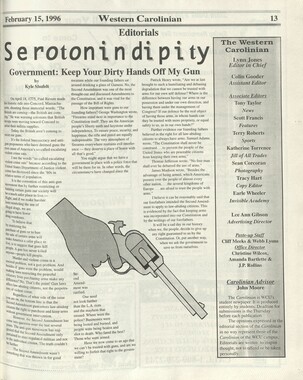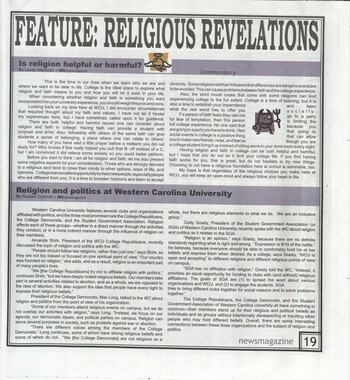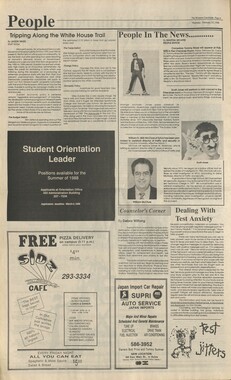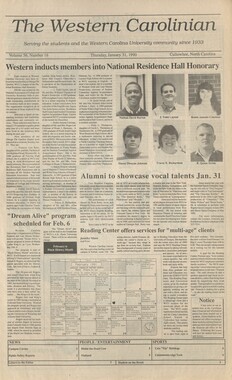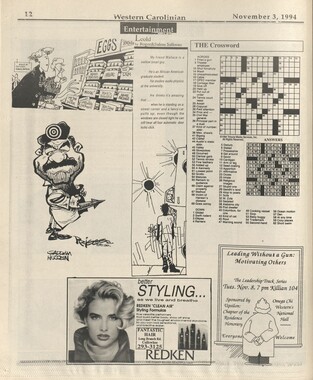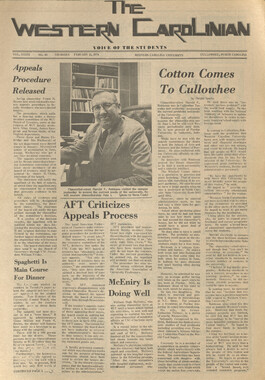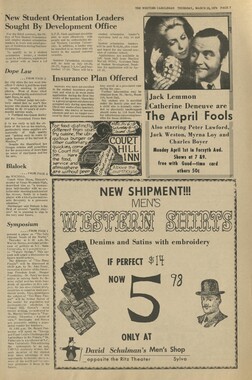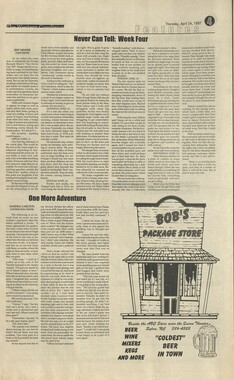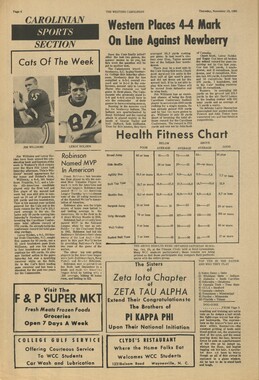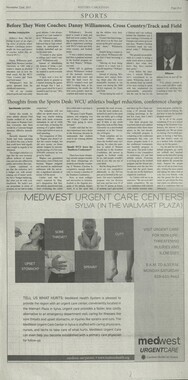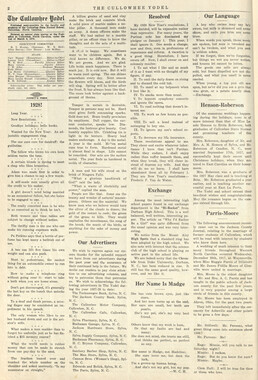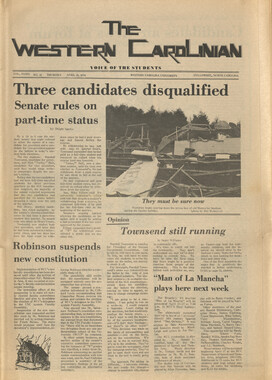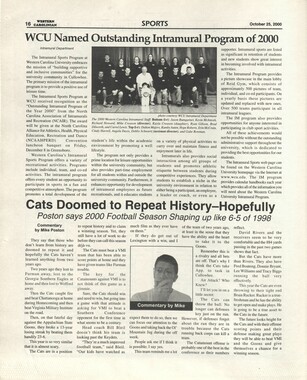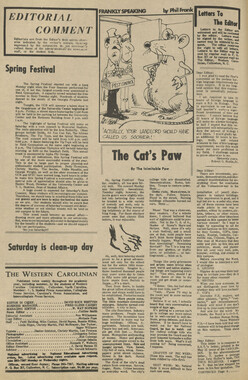Western Carolina University (20)
View all
- Canton Champion Fibre Company (2308)
- Cherokee Traditions (291)
- Civil War in Southern Appalachia (165)
- Craft Revival (1942)
- Great Smoky Mountains - A Park for America (2946)
- Highlights from Western Carolina University (430)
- Horace Kephart (941)
- Journeys Through Jackson (159)
- LGBTQIA+ Archive of Jackson County (85)
- Oral Histories of Western North Carolina (314)
- Picturing Appalachia (6873)
- Stories of Mountain Folk (413)
- Travel Western North Carolina (160)
- Western Carolina University Fine Art Museum Vitreograph Collection (129)
- Western Carolina University Herbarium (92)
- Western Carolina University: Making Memories (738)
- Western Carolina University Publications (2488)
- Western Carolina University Restricted Electronic Theses and Dissertations (146)
- Western North Carolina Regional Maps (71)
- World War II in Southern Appalachia (131)
University of North Carolina Asheville (6)
View all
- Allanstand Cottage Industries (62)
- Appalachian National Park Association (53)
- Bennett, Kelly, 1890-1974 (1463)
- Berry, Walter (76)
- Brasstown Carvers (40)
- Carver, George Washington, 1864?-1943 (26)
- Cathey, Joseph, 1803-1874 (1)
- Champion Fibre Company (233)
- Champion Paper and Fibre Company (297)
- Cherokee Indian Fair Association (16)
- Cherokee Language Program (22)
- Crowe, Amanda (40)
- Edmonston, Thomas Benton, 1842-1907 (7)
- Ensley, A. L. (Abraham Lincoln), 1865-1948 (275)
- Fromer, Irving Rhodes, 1913-1994 (70)
- George Butz (BFS 1907) (46)
- Goodrich, Frances Louisa (120)
- Grant, George Alexander, 1891-1964 (96)
- Heard, Marian Gladys (60)
- Kephart, Calvin, 1883-1969 (15)
- Kephart, Horace, 1862-1931 (313)
- Kephart, Laura, 1862-1954 (39)
- Laney, Gideon Thomas, 1889-1976 (439)
- Masa, George, 1881-1933 (61)
- McElhinney, William Julian, 1896-1953 (44)
- Niggli, Josephina, 1910-1983 (10)
- North Carolina Park Commission (105)
- Osborne, Kezia Stradley (9)
- Owens, Samuel Robert, 1918-1995 (11)
- Penland Weavers and Potters (36)
- Roberts, Vivienne (15)
- Roth, Albert, 1890-1974 (142)
- Schenck, Carl Alwin, 1868-1955 (1)
- Sherrill's Photography Studio (2565)
- Southern Highland Handicraft Guild (127)
- Southern Highlanders, Inc. (71)
- Stalcup, Jesse Bryson (46)
- Stearns, I. K. (213)
- Thompson, James Edward, 1880-1976 (226)
- United States. Indian Arts and Crafts Board (130)
- USFS (683)
- Vance, Zebulon Baird, 1830-1894 (1)
- Weaver, Zebulon, 1872-1948 (58)
- Western Carolina College (230)
- Western Carolina Teachers College (282)
- Western Carolina University (2005)
- Western Carolina University. Mountain Heritage Center (18)
- Whitman, Walt, 1819-1892 (10)
- Wilburn, Hiram Coleman, 1880-1967 (73)
- Williams, Isadora (3)
- Cain, Doreyl Ammons (0)
- Crittenden, Lorraine (0)
- Rhodes, Judy (0)
- Smith, Edward Clark (0)
- Appalachian Region, Southern (2569)
- Asheville (N.C.) (1923)
- Avery County (N.C.) (26)
- Blount County (Tenn.) (195)
- Buncombe County (N.C.) (1672)
- Cherokee County (N.C.) (283)
- Clay County (N.C.) (555)
- Graham County (N.C.) (236)
- Great Smoky Mountains National Park (N.C. and Tenn.) (519)
- Haywood County (N.C.) (3569)
- Henderson County (N.C.) (70)
- Jackson County (N.C.) (4909)
- Knox County (Tenn.) (35)
- Knoxville (Tenn.) (13)
- Lake Santeetlah (N.C.) (10)
- Macon County (N.C.) (420)
- Madison County (N.C.) (215)
- McDowell County (N.C.) (39)
- Mitchell County (N.C.) (132)
- Polk County (N.C.) (35)
- Qualla Boundary (982)
- Rutherford County (N.C.) (76)
- Swain County (N.C.) (2182)
- Transylvania County (N.C.) (270)
- Watauga County (N.C.) (12)
- Waynesville (N.C.) (86)
- Yancey County (N.C.) (72)
- Aerial Photographs (3)
- Aerial Views (60)
- Albums (books) (4)
- Articles (1)
- Artifacts (object Genre) (228)
- Bibliographies (1)
- Biography (general Genre) (2)
- Cards (information Artifacts) (38)
- Clippings (information Artifacts) (191)
- Copybooks (instructional Materials) (3)
- Crafts (art Genres) (622)
- Depictions (visual Works) (21)
- Design Drawings (1)
- Drawings (visual Works) (185)
- Envelopes (73)
- Exhibitions (events) (1)
- Facsimiles (reproductions) (1)
- Fiction (general Genre) (4)
- Financial Records (12)
- Fliers (printed Matter) (67)
- Glass Plate Negatives (381)
- Guidebooks (2)
- Internegatives (10)
- Interviews (815)
- Land Surveys (102)
- Letters (correspondence) (1013)
- Manuscripts (documents) (618)
- Maps (documents) (177)
- Memorandums (25)
- Minutes (administrative Records) (59)
- Negatives (photographs) (6090)
- Newsletters (1290)
- Newspapers (2)
- Notebooks (8)
- Occupation Currency (1)
- Paintings (visual Works) (1)
- Pen And Ink Drawings (1)
- Periodicals (193)
- Personal Narratives (10)
- Photographs (12976)
- Plans (maps) (1)
- Poetry (5)
- Portraits (4568)
- Postcards (329)
- Programs (documents) (181)
- Publications (documents) (2440)
- Questionnaires (65)
- Relief Prints (26)
- Sayings (literary Genre) (1)
- Scrapbooks (282)
- Sheet Music (2)
- Slides (photographs) (402)
- Songs (musical Compositions) (2)
- Sound Recordings (796)
- Specimens (92)
- Speeches (documents) (18)
- Tintypes (photographs) (8)
- Transcripts (322)
- Video Recordings (physical Artifacts) (23)
- Text Messages (0)
- A.L. Ensley Collection (275)
- Appalachian Industrial School Records (7)
- Appalachian National Park Association Records (336)
- Axley-Meroney Collection (2)
- Bayard Wootten Photograph Collection (20)
- Bethel Rural Community Organization Collection (7)
- Blumer Collection (5)
- C.W. Slagle Collection (20)
- Canton Area Historical Museum (2110)
- Carlos C. Campbell Collection (462)
- Cataloochee History Project (64)
- Cherokee Studies Collection (4)
- Daisy Dame Photograph Album (5)
- Daniel Boone VI Collection (1)
- Doris Ulmann Photograph Collection (112)
- Elizabeth H. Lasley Collection (1)
- Elizabeth Woolworth Szold Fleharty Collection (4)
- Frank Fry Collection (95)
- George Masa Collection (173)
- Gideon Laney Collection (452)
- Hazel Scarborough Collection (2)
- Hiram C. Wilburn Papers (28)
- Historic Photographs Collection (236)
- Horace Kephart Collection (861)
- Humbard Collection (33)
- Hunter and Weaver Families Collection (1)
- I. D. Blumenthal Collection (4)
- Isadora Williams Collection (4)
- Jesse Bryson Stalcup Collection (47)
- Jim Thompson Collection (224)
- John B. Battle Collection (7)
- John C. Campbell Folk School Records (80)
- John Parris Collection (6)
- Judaculla Rock project (2)
- Kelly Bennett Collection (1482)
- Love Family Papers (11)
- Major Wiley Parris Civil War Letters (3)
- Map Collection (12)
- McFee-Misemer Civil War Letters (34)
- Mountain Heritage Center Collection (4)
- Norburn - Robertson - Thomson Families Collection (44)
- Pauline Hood Collection (7)
- Pre-Guild Collection (2)
- Qualla Arts and Crafts Mutual Collection (12)
- R.A. Romanes Collection (681)
- Rosser H. Taylor Collection (1)
- Samuel Robert Owens Collection (94)
- Sara Madison Collection (144)
- Sherrill Studio Photo Collection (2558)
- Smoky Mountains Hiking Club Collection (616)
- Stories of Mountain Folk - Radio Programs (374)
- The Reporter, Western Carolina University (510)
- Venoy and Elizabeth Reed Collection (16)
- WCU Gender and Sexuality Oral History Project (32)
- WCU Mountain Heritage Center Oral Histories (25)
- WCU Oral History Collection - Mountain People, Mountain Lives (71)
- WCU Students Newspapers Collection (1920)
- Western North Carolina Tomorrow Black Oral History Project (69)
- William Williams Stringfield Collection (2)
- Zebulon Weaver Collection (109)
- African Americans (390)
- Appalachian Trail (35)
- Artisans (521)
- Cherokee art (84)
- Cherokee artists -- North Carolina (10)
- Cherokee language (21)
- Cherokee pottery (101)
- Cherokee women (208)
- Church buildings (189)
- Civilian Conservation Corps (U.S.) (111)
- College student newspapers and periodicals (2009)
- Dams (107)
- Dance (1023)
- Education (222)
- Floods (61)
- Folk music (1015)
- Forced removal, 1813-1903 (2)
- Forest conservation (220)
- Forests and forestry (1184)
- Gender nonconformity (4)
- Great Smoky Mountains National Park (N.C. and Tenn.) (181)
- Hunting (45)
- Landscape photography (25)
- Logging (119)
- Maps (83)
- Mines and mineral resources (8)
- North Carolina -- Maps (18)
- Paper industry (38)
- Postcards (255)
- Pottery (135)
- Railroad trains (72)
- Rural electrification -- North Carolina, Western (3)
- School integration -- Southern States (2)
- Segregation -- North Carolina, Western (5)
- Slavery (5)
- Sports (452)
- Storytelling (243)
- Waterfalls -- Great Smoky Mountains (N.C. and Tenn.) (66)
- Weaving -- Appalachian Region, Southern (280)
- Wood-carving -- Appalachian Region, Southern (328)
- World War, 1939-1945 (173)
Western Carolinian Volume 34 (33) Number 21
Item
Item’s are ‘child’ level descriptions to ‘parent’ objects, (e.g. one page of a whole book).
-
-
CAROLINIAN EDITORIALS No Politics, Please The Charlotte Observer's article concerning the possibility of Dan K„ Moore becoming president of Western Carolina University came as no surprise to us. It is quite true that rumors have been strong here that the Governor would assume the post as soon as he vacates the Raleigh capital. Few positions could be offered the governor that would be as prestigious as president of the progressive university in his own Western North Carolina. An institution he has always loved. An institution he has aided throughout the years. An institution of which his wife is a member of the Board of Trustees. Undoubtedly with Moore's political ties, he could aid the University politically, education being a favorite bedfellow of North Carolina Politics. We doubt seriously that the reports that he might become president "came as a complete surprise- to Moore, as he indicated in a carefully worded statement released to the press following the Observer article. There are several reasons for our skepticism. One, as we have mentioned before, is the persistence of rumors on campus and off from administrators, students and alumni. Since the governor does have "strong ties* with the Board of Trustees, (being married to one of its members) he has undoubtedly heard from this source. If, by chance, he failed to get wind of the "rumor* in this fashion, area radio stations and newspapers have hinted, if not directly indicated, that the Gov= ernor would be WCU's next president As early as last fall the Svlva radio station. WMSJ. carried a somewhat vehement editorial strongly opposing ; a certain politician for the presidency. President Paul A„ Reid, in a recent interview, stated that he had no knowledge whatsoever that Moore was even being considered for the position. He stated the the committee had met several times but had not made a public report of the progress. At the present time, Reid does not know whom the committee is considering. To name Dan K. Moore as president of the University would, in our opinion, be disastrous. Moore, is a politician from the word go. We do not need a politician as president of Western Carolina, We dc not need a man who can only serve the institution from a political standpoint, playing the state game with the big men in Raleigh. We do not need a mar whose political affiliations are committed to a giver, camp. We do not need a man who has taken a middle of the road course on almost every issue during his three years as governor. We do not need a man who can serve the institution for only three years. We need a young, aggressive educator who can move forward with the University and aid in this movement, We need a man with fresh ideas and an understanding of all educaLional avenues and opportunities open to the University. We need a man with an understanding of students--their ambitions, their goals. TheWESTERN CAROLINIAN VOICI OF TH( JTl'DENTS Published semi-weekly by the students of Western Carolina University, Cullowhee, N. C Member of: Associated Collegiate Press; Collegiate Press Service; Carolinas Coilegiau Press Association; United States Student Press Association. EDITOR BUSINESS MANAGER CHARLOTTE A. WISE JAMES S. CHAPPELL I Feature Editor - navid Watsor Sports Editor Tom Milan Copy Editors Linda Norwood, Sue Turnej Circulation Manager Ed Coohi Se^.-etary ' Vicki Jacksoi Columnists Grady Cooper, David Watson, Freeman D. Jones, Bit Biggers, Steve Guimond, Jerry Conner, The Paw ii. Writers Janice Montelth, Patti Johnson, Gary Tyler, Ken Bal Jane Burrow, Patsy Warren, Patrick Boykin, Doug Sebring, Jerry Conner Sharon Ellerbe, Jay Gertz. Cartoonist Larry C B. Whitest* Photographer T. C Fendei Typists charon Shook, Patti Johnson, Judi DeCarli Sponsor Steven P. Bed Editor Emeritus J. Nicholas Tayloi National advertising by National Advertising Service, Inc. Local advertising rates availabli upon request. Phone 293-7267 Monday or Wednesday nights. Offices, second floor Joyner; Phone, 293-7267; Mailing Address, P. 0. Box 317, Cullowhee N. C. 28723; SbuscripUon rate, S4.00 per year. FEEDBACK Brown Defends Faculty The following i<< a precis of a trial held in the Court of Common Pleas, London, England, on January 12, 1784. The case is that of Dr. Samuel Johnson, a faculty member of Cambridge University, Plaintiff, versus the Cambridge University and the Government of Great Britain. Mr. James Bos- well, a Scottish Advocate, plead the case for Dr, Johnson, while Mr. Billy Joe Wordsworth of Alfoxden served as Counsel for the defense. . Mr. Boswell stated Dr. Johnson's complaint in his opening remarks, noting that the Doctor had been invited to speak at a seminar held in one of the meeting halls of the University, and had parked his single-horse carriage just outside the building in an area outlined in red and marked "Visitor!" When the Doctor left the building (said Mr, Boswell) and prepared to drive off to another engagement, he discovered on his windscreen a summons which noted that his carriage was situated in a zone reserved for visitors and that the fine was in the amount of two pounds sterling. Also, Dr. Johnson discovered, to his amazement and despair, that his driving whip and two of his horses' shoes were missing.as well as approximately six inches of his horses' tail. Fur thermore, the reins had been slashed, apparently by the same vandals who pilfered the other items." The court record shows that Dr. Johnson was the first wit" ness to appear on the stand. He was questioned by the defense counsel, Mr, Wordsworth, an account of which follows: WORDS: Dr, Johnson, did you, on Uie night of November 17, 1783, park your carriage in the area indicated in the summons? DR. J: Sir, I did, for I was to speak to a learned company within the Hall adjacent to the location. YVOR S rHd you not notice the "Visitors" sign painted on the road surface within the parking space, where you knowingly and illegally parked your carriage? DR. J: Sir, the paint was not only starkly visible to my poor eyes, but, indeed, it beckoned me, a visitor to the Hall and a Member of the Faculty of the University, to occupy the space in my capacity as invited guest of the company within the Hall. And I shouldhope, Sir, that wherever I shall park, I shall do it "knowingly," but I disdain to recognize your erroneous use of the term "illegally," for where should a visitor park but in the area that cries to mm in brilliant scarlet to use the zone? And where is the law that says I cannot park there? WORDS: You were illegally parked, according to the statutes of the Student Handbook of the University. Are you aware of that code, Sir? DR : I am, Sir, quite aware of that text, for I helped to edit it; but I am equally aware of the new Constitution of those rebellious American States, the rules of which apply to me no more than do those in the Student Handbook. WORDS: You believe then, Dr. Johnson, that what applies to the students of this University does not apply to you as a Faculty Person therein? DR. J: Precisely so, Sir, for in spite of the protestation of that benighted fool, Rousseau, that we should all divest ourselves of our garments and return to a natural, equal state of existence, I hold that different rules are made to apply to the various ranks of the University order, that is to say, the Administrationiaye rules governing their official position, parking included; the Faculty have rules pertaining to them, as stated in the Faculty Handbook and in their Contracts with the University; and the students have rules concerning them set down in the Student Handbook, WORDS: And what does your Faculty Handbook state concerning the rules governing parking on the University Campus? DR J: Sir, amidst all its fluently stated and effectively structured principles, the Handbook omits the issue en~ tirely. WORDS: Then, Sir, there are no rules pertaining to the Faculty as far as parking is concerned? DR J. That is the basis, Sir, for this case; the absence of rules for Faculty parking renders invalid any summons issued to Faculty Persons, for upon what ground may the summons be based? To be sure, Sir, attempts have been made by various groups to define the rules, but nothing of lasting quality has yet been accepted by all concerned. Some areas near the classroom buildings have been designated for Faculty use, but these are nearly always over-run with the carriages and horses of persons attached to the University in some capacity other :han teaching, due to a lack of clarity in the law. Here, Mr. Wordsworth ended nis questioning, and Mr, Boswell proceeded to call Mr. Harley Coppins of the University Constabulary, an ac count of whose remarks follows: BOS: Upon what authority- did you present Dr. Johnson's carriage with a summons. Did you not recognize the vehicle, with its identification tag on the back window, as being his? COP: Why, certainly, Sir, I know Dr. Johnson's carriage well; but no-one is to park in that area except visitors to the Custodian of the Hall. BOS: How did you ascertain that Dr. Johnson was indeed not a visitor to the Custodian? COP: I did not know whether he was visiting the Custodian ocnot, Sir; I merely speculated that he was not, BOS: Obviously, Sir, I have no more to ask of you, except as concerns the vandalism perpetrated upon Dr. Johnson's property. COP: Oh, we found all that, Sir, except the section of the tail, and returned it to the Doctor. All of it turned up in a student's room, and when he gave it back so nicely, we said no more to him. BOS: Again, Sir, I will ask you no more questions, for yok have presentd a better case for the plaintiff- than any advo= cate could. Mr. Boswell stepped aside and, there being no more witnesses on either hand, allowed Mr. Wordsworth to proceed with his summation. Counselor Wordsworth, after noting that the "youth of every age should set examples to be followed and admired by their elders," and that "all people—students, Faculty, and otherwise—who come to the Campus for what purpose soever are subject to the rules determined by the students in the absence of any other law: or official voice," then harangued the jury for four hours with his fundamental principles of human nature. At four in the afternoon, the judge, an eminent Frenchman named Isidore Robespierre, nodded to Mr. Boswell to give his summation, which he did after requesting the Judge's permission to awaken the jury. Mr. Boswell asked the jury to consider the absence of any definite law governing the parking privileges of the Faculty and to acknowledge the absurdity- of Dr. Johnson's being handed a summons on the assumption of the Constable that the Doctor was not visiting the Custodian. "Futhermore (said Mr. Boswell) several other Faculty Persons have recently been arraigned by this Court on similar charges, Persons whose names along with CONTINUED, Page 3
Object
Object’s are ‘parent’ level descriptions to ‘children’ items, (e.g. a book with pages).
-
The Western Carolinian is Western Carolina University’s student-run newspaper. The paper was published as the Cullowhee Yodel from 1924 to 1931 before changing its name to The Western Carolinian in 1933.
-
